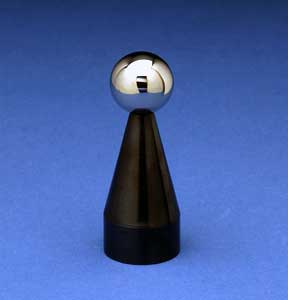
| Established in 1952 |  |
Page: 3260 |

Type 440C Stainless Steel is widely used in
antifriction bearings, in valves and in many other applications
where high hardness and reasonable corrosion resistance is
required. This material is much more resistant to abrasion and
wear than chrome steel. It is a high alloy, fine grain, through
hardening, Martensitic stainless steel. Because of its high
hardness and fine grain structure, it can be finished to a fine
dimensional quality.
HARDNESS This material will harden to 58 rockwell "C" (58 HRC) minimum. The hardness is measured on parallel ground flats or the reading taken on the spherical surface is corrected for the curve. The HRC scale uses 150 kilogram load ( approximately 330 lb. ) applied to a conical diamond "brale" indenter.
DENSITY of this material is .277 pounds per cubic inch ( 7.67 g/cm^3) .
MAGNETIC This material is strongly attracted by a magnetic field.
machinability In the hardened condition, this material can be ground, honed, and lapped using conventional abrasives. It can be shaped and drilled using electric discharge machining or ultrasonic cavitation. In the annealed condition this material can be machined using normal techniques.
WELDABILITY Because this material
has 1% carbon, it is difficult to obtain a quality weld. It can
be resistance welded with difficulty. It can be soft soldered
with a high tin solder using an acid flux. It can be silver
soldered or brazed, but the heat will cause distortion of the
ball and a considerable loss of hardness. For light load
applications, the ball can be attached with an adhesive such as
epoxy. When adhesive bonding is used, an area on the ball
should be roughed up by etching or abrasive blasting.
Chemical Analysis |
|
| Carbon | 0.86-1.2% |
| Molybdenum | 1.0% Max |
| Chromium | 16.0-18.0% |
| Manganese | 1.0% Max |
| Silicon | 1.0% Max |
| Sulfur | 0.03% Max |
| Phosphorus | 0.04% Max |
| Ferrite | Balance |
| Previous, Stainless Steel Type 316 |
Micro Surface Engr. Inc. http://www.precisionballs.com |
||||||||
|---|---|---|---|---|---|---|---|---|